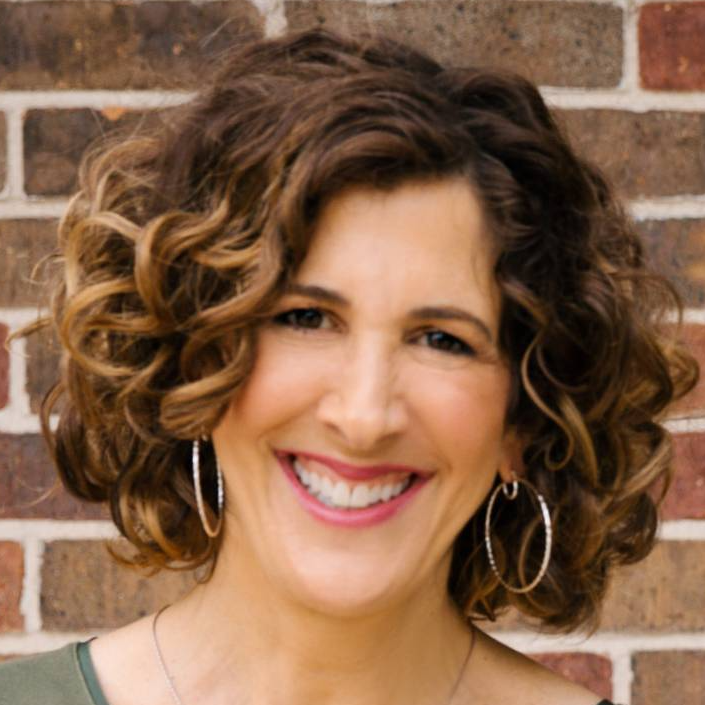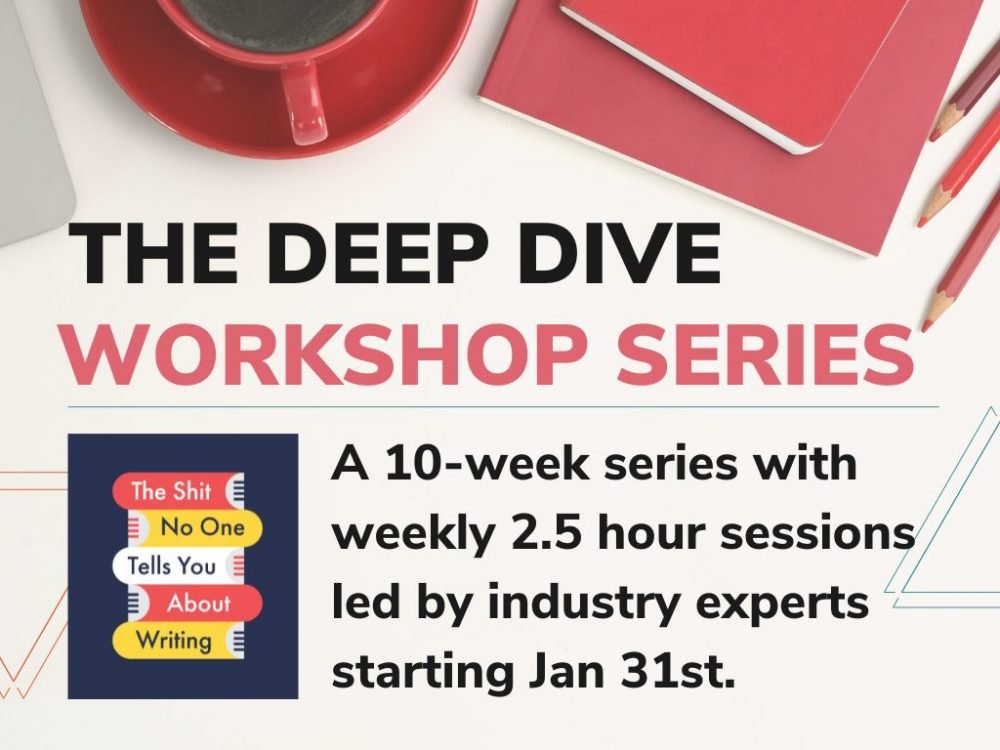
Ask the Editor is a column for your questions about the editing process and editors themselves. It’s a place to bring your conundrums and dilemmas and mixed feelings, no matter how big or small. Want to be considered? Learn more and submit your question.
This month’s Ask the Editor is sponsored by The Shit No One Tells You About Writing Podcast. Step up your writing game and meet fellow writers with The Deep Dive Workshop, a 10-week series from the podcast hosts of The Shit No One Tells You About Writing. Each week you’ll hear from expert writers and editors, followed by workshops led by Bianca, Carly or CeCe.
Question
I’m a few pages away from finishing a first draft of a multi-generational novel that runs about 500 pages, which I plan to pitch to agents and traditional publishers. After two years of revisions and polishing, I feel the draft is in good shape (don’t we all?) but am wondering if I should pay for a professional editor to look at it or just get feedback from beta readers. Is an editor worth the money? Note that I have published a nonfiction book before with an indie publisher but this is my first novel. Appreciate your thoughts.
—Seeking advice in Pennsylvania
Dear Seeking:
I often joke that the least-popular answer in this business—and yet the one that applies most often—is “it depends.” That’s the answer to both of your questions, but let me elaborate a bit on each one.
Should I Hire an Editor?
Whether a professional editor might be useful at this point depends on where you are in your drafting process, on your goals for a particular manuscript, and on what type of edit you’re considering.
Where you are: Every author seems to define “first draft” differently—from the raw initial “vomit draft” to the first revised version that you’ve taken as far as you’re able to on your own. Judging from your description, it sounds like your first draft is the latter.
That can be a great time to seek an editor, if you plan to—but you asked about seeking beta readers at this point, and for my money (literally), that and/or critique partners is where I’d start.
Before you pay a professional the often thousands of dollars a developmental edit can cost, why not see how well what you’ve done on your own is working on the page through the eyes of some trusted readers? The feedback they offer may help you see any weaknesses in the story and fine-tune even further—and then you can determine whether to hire an editor.
Your goals and type of edit: I’m assuming (despite the rampant dangers of doing so) that you are referring to a developmental edit with your question. You mention that you are planning to submit this story to agents—some of whom may offer editorial feedback—and to seek a traditional publisher, where you will get developmental editing in-house. In that case hiring your own editor may not be necessary.
But that presupposes that your manuscript is solid and marketable enough to pass through these gatekeepers. That’s a hard thing to determine—but this self-editing checklist may help you assess whether you’re ready for prime time, as can feedback you receive from critique partners and beta readers.
And of course if you’ve been submitting and are getting only rejections or crickets, that may be another indication that you might strengthen the story with the help of a pro. As is your gut—I find most authors have an intuitive sense of when something isn’t quite working as well as they want it to, or that certain areas of the story don’t hold together as strongly as they could, even if they may not be certain what it is or how to address it. That’s where an editor can help.
You won’t likely need to hire a copyeditor for a traditional publishing path unless you have major grammar/spelling/usage issues that may negatively impact agents’ and editors’ experience of your manuscript.
For authors considering self-publishing, I highly recommend a professional developmental editor as well as a copyeditor and a proofreader so that their story and mechanics are at a competitive level with traditionally published books, which will have gone through these processes. Sometimes this applies to small presses too, some of which may not offer comprehensive or deep editing.
One thought specific to your situation I’d like to add is that while you don’t mention word count, 500 industry-standard formatted pages translates to about 125,000 words. While that’s an acceptable length for some fiction, higher page count means higher production costs, and publishers may not always be willing to invest the extra money in an unproven debut author (which you’ll likely be considered, as this is your first work of fiction).
That might make it harder to find a publisher, and a good development editor may be able to help you see how to tighten the story to a more marketable length.
Is a Professional Edit Worth It?
Your second question—is an editor worth the money?—has the same squishy answer: It depends.
A good, in-depth, constructive professional developmental edit is worth every penny of the often significant investment. It will pinpoint areas of weakness you may have been blind to, gaps you may not have seen because you are filling in the blanks in your head, and unclear or underdeveloped areas that may hamper a reader’s investment and engagement in your story.
A good editor will not just offer objective, constructive feedback, but will make it actionable, specifying why something may not be working as well as it could, and also pointing you toward concrete ways to address those areas—all, ideally, while respecting your vision and your voice and helping you get them on the page as effectively as possible. And it will improve your skills in these areas for your subsequent manuscripts.
But an unskillful edit is not only a waste of money, but can do more damage to your story and you as a writer than nearly anything else, potentially pushing your story in a direction you didn’t intend, diluting or hijacking your voice or vision, and even undercutting your confidence in your writing and yourself.
All edits—and all editors—are not created equal, and it’s of highest importance to carefully vet anyone you’re considering working with for their qualifications, experience, skill, and how well they “get” you and your intentions (preferably with a sample edit, which I usually recommend not hiring a developmental editor without).
Jane and editor Chantel Hamilton have a great guide here for making sure you hire someone who will elevate your work (and red flags to watch out for), I have tips here as well, including where to look for reputable editors. It takes time and effort to carefully vet an editor, but it pays off exponentially.
If you are self-publishing, a good professional copyeditor and proofreader will also rank among the best money you can spend. Readers can be brutally unforgiving of mistakes and typos, and unlikely to get past sloppy mechanics no matter how good your story is. As with development editors, make sure to hire pros with solid experience in your medium (i.e., book publishing, rather than academics or journalism, for example).
I’m not of the school of thought that every author needs to hire a professional editor with every manuscript—I know plenty of authors who have sold books without doing so. But if you’ve stretched yourself to the utmost and done all you can, and still have reason to suspect your story is not quite “there” yet, a good, reputable edit may be just the resource you need to push you across the finish line.
This month’s Ask the Editor is sponsored by The Shit No One Tells You About Writing Podcast. Step up your writing game and meet fellow writers with The Deep Dive Workshop, a 10-week series from the podcast hosts of The Shit No One Tells You About Writing. Each week you’ll hear from expert writers and editors, followed by workshops led by Bianca, Carly or CeCe.

Tiffany Yates Martin has spent nearly thirty years as an editor in the publishing industry, working with major publishers and New York Times, Washington Post, Wall Street Journal, and USA Today bestselling and award-winning authors as well as indie and newer writers. She is the founder of FoxPrint Editorial and author of the bestseller Intuitive Editing: A Creative and Practical Guide to Revising Your Writing. She is a regular contributor to writers’ outlets like Writer’s Digest, Jane Friedman, and Writer Unboxed, and a frequent presenter and keynote speaker for writers’ organizations around the country. Under her pen name, Phoebe Fox, she is the author of six novels. Visit her at www.foxprinteditorial.com.


I wish I’d read a post like this four months ago. Great info, all in one place.
Luckily, I did piece together a guide for myself via Google and hired a developmental editor through Reedsy.
I reviewed several editors’ profiles before sending out my project for bid to five editors. I selected the one that I thought was best for my YA novel. The work was completed on time, within budget, and I’m very pleased with the outcome.
Thanks, Mona. It sounds like you did everything right for your own project in seeking a good editor–and that it paid off for you. It really is worth every bit of time and effort it takes in researching and vetting when selecting the right person for your story and style, isn’t it? Thanks for your comment.
Caveat emptor.
Based on the recommendation of a well-respected agent in my genre, I hired a development editor. The comment that told me I had wasted my money was “You need to let the reader know where the story takes place.” First chapter, first page, second paragraph “…the only thing open on Houston’s northside was drive-thru joints.” First paragraph, first page, second chapter, “A bad-day sunrised dawned over the Port of Houston…”
I can be ignored for free but I paid nearly $3K for this malpractice. Bottom line, at some point you simply have to trust your story.
Not all edits–or editors–are created equal, and an unskillful one can feel like a waste of an author’s time, money, and effort. And you are dead right that the author is the ultimate arbiter of her or his story–because it is your story.
But a good editor helps an author put their vision on the page as effectively and impactfully as possible; holds up the mirror to where they may not have conveyed their intentions as clearly or deeply as possible to engage readers; and otherwise serves as an author’s Sherpa to the summit. Good editors will help you see your own writing and story more clearly and convey it more effectively in a way that will benefit you in everything you write going forward.
I’m sorry you had what sounds like an unfortunate experience–but I encourage you not to paint all editors with the same brush. They are a resource for your writing–and like any other resource, mileage may vary. I do offer an extensive guide to finding and vetting editors to help find a knowledgeable, experienced one who is a good fit in my Get It Edited guide here that may be useful.
Good luck with all your writing, Elias!
It’s not so easy to just “vet” an editor. All you have to go by is a list of books they’ve edited that you haven’t read. You’re really just making a hopeful assumption. Also, your agent will give you notes, if you’re taking that route, as will, presumably, your publisher. Better spend your time building a “platform” or writing something that excites the p&l bunch. Does proper grammar even matter any more?
It’s not easy, for sure–it takes time and effort–but those expenditures are well worth it to save the expenditure of thousands of dollars that may wind up not benefiting you if you wind up with an unskillful edit, not to mention the damage one can do to your writing and your psyche. (I mentioned my Get It Edited guide above, an extensive how-to for finding and vetting good, reputable editors, which offers specific ways to know what you’re getting before you sign a contract so you don’t have to make those “hopeful assumptions” you mention.)
A developmental edit–most of what we’re talking about here–is much more than grammar (which does matter, very much! Ask readers, who can get quite hot under the collar at finding mistakes in published books… 🙂 ). It’s a deep dive into every aspect of the story and writing that–ideally–will allow the author to put the most effective version of her vision on the page for the maximum impact and engagement with readers. A platform doesn’t matter if you aren’t engaging the people you hope to build it with–with the strongest possible stories.
As you and I both pointed out, if trad pubbing you’ll often (but not always!) get editorial feedback from your in-house editor and possibly your agent. But some stories may need a deeper dive than experience, training, or economic realities of the business may allow for with those pros–and that’s one good time (among others) to hire an editor who can provide it.
Bottom line–I agree that hiring an editor isn’t always necessary…but it can be one hell of a power tool for an author when the job may call for it. Thanks for your perspective, Nick.
A great editor is worth their weight in gold! (And some are pretty heavy from sitting all day in a chair.) But you need to find the right one for YOU.
My first editor was good, but I found the way he worked very confusing & time consuming.
The editor for my second book was amazing. I knew her from her work locally so that helped. She really respected what I was trying to do & often asked for more. Fill in the blanks kind of stuff which is exactly what I needed as I write bare bones, then go back & keep adding & fine tuning.
I hope you find the editor that’s perfect for your writing style & intentions.
Great editors can be the best investment an author can make in their career, for sure. And yes, “fit” is so important. Glad you found someone you work so well with!